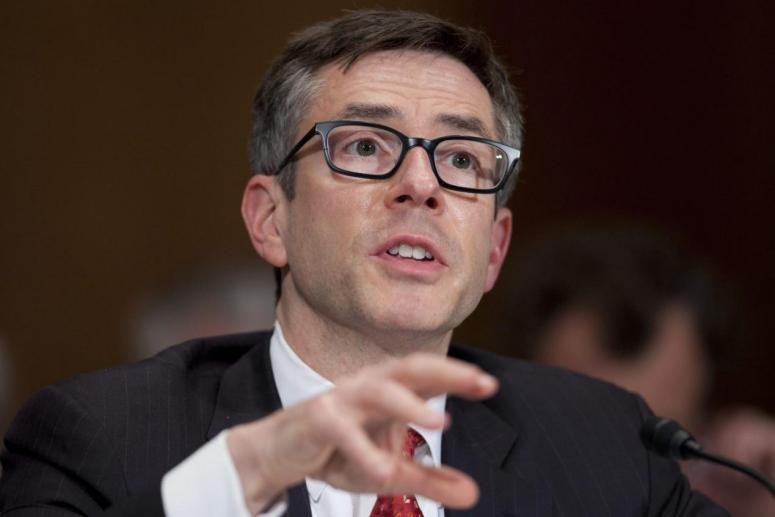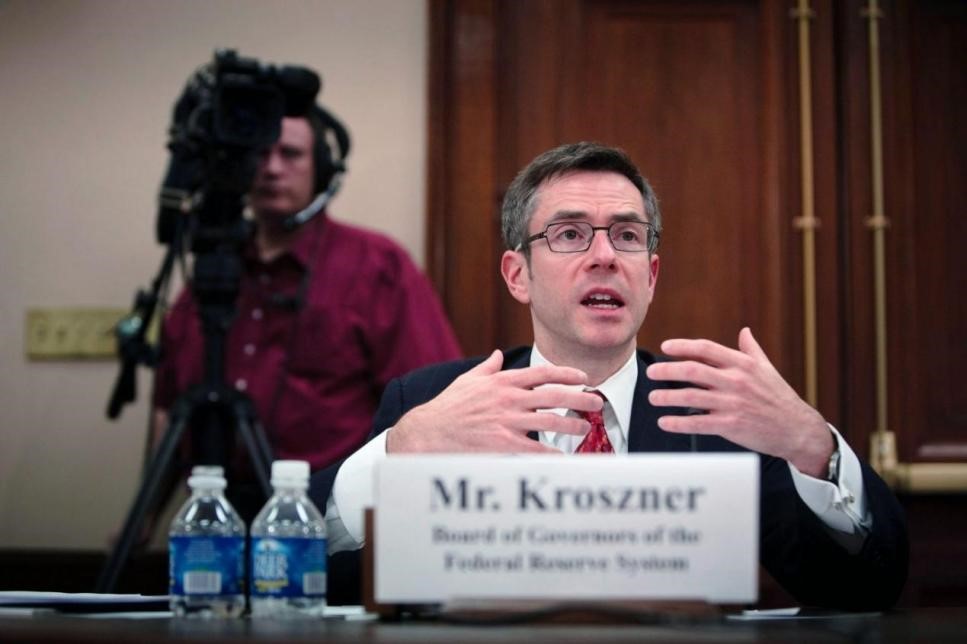
銀行業(yè)新規(guī)通常并不會引起公眾的關(guān)注,?!栋腿麪枀f(xié)議III》終局規(guī)則(B3E)則有些不同——而且吸引眼球的不僅僅是這個朗朗上口的漫威式綽號。
美國的知名銀行家以及眾多保守派議員,、行業(yè)協(xié)會和游說組織紛紛抵制B3E,。他們認(rèn)為該規(guī)則將使消費者和企業(yè)付出高昂的代價。有反對者甚至斥巨資投放廣告,,說服選民“阻止巴塞爾終局”,,因為它有可能導(dǎo)致經(jīng)濟放緩。
什么是B3E規(guī)則,?B3E規(guī)則是由來自26個國家的監(jiān)管者和央行官員組成的巴塞爾委員會(Basel Committee)為應(yīng)對2007年至2008年全球金融危機(Global Financial Crisis)而制定的一套國際銀行業(yè)改革措施(《巴塞爾協(xié)議III》)的最終版,。
《巴塞爾協(xié)議III》的目的是完善銀行抵御經(jīng)濟沖擊和金融壓力的能力,同時提高銀行的透明度,。但直到2023年7月,,美聯(lián)儲(Federal Reserve)、美國貨幣監(jiān)理署(Office of the Comptroller of the Currency)和美國聯(lián)邦存款保險公司(Federal Deposit Insurance Corporation)才共同提出了《巴塞爾協(xié)議III》終局規(guī)則,,最終確定了相關(guān)規(guī)定,。
該規(guī)則擬將資產(chǎn)規(guī)模超過7,500億美元的大型銀行的資本要求提高16%至25%,而小型銀行的資本要求將提高約11%,。
B3E規(guī)則還要求銀行使用標(biāo)準(zhǔn)化風(fēng)險模型,,改變風(fēng)險加權(quán)資產(chǎn)的計算方法,并且到2028年在資本要求計算中必須使用名為“累計其他綜合收益”(AOCI)的新指標(biāo),。所有這一切都招致了銀行的批評,,這也在情理之中,,因為一項研究顯示,僅在2025年,,B3E就可能使銀行的營收損失350億美元,。而且,除了銀行以外,,從農(nóng)民到美聯(lián)儲前官員,,批評者大有人在。就連曾經(jīng)在全球金融危機期間擔(dān)任銀行機構(gòu)監(jiān)督管理委員會(Committee on Supervision and Regulation of Banking Institutions)主席的美聯(lián)儲前理事蘭德爾·S·克羅茲納也公開表示反對,。
現(xiàn)任芝加哥大學(xué)(University of Chicago)布斯商學(xué)院(Booth School of Business)諾曼·R·博賓斯經(jīng)濟學(xué)教授的克羅茲納在最新發(fā)表的一篇論文中表示,,B3E不僅會讓銀行付出高昂的代價,還會給全美消費者和企業(yè)造成“意外后果”,。

克羅茲納擔(dān)心,,從增加借貸成本、減少貸款供應(yīng),,到降低股票市場流動性,、激發(fā)風(fēng)險更高的民間借貸,B3E可能弊大于利,。
這位美聯(lián)儲的前理事在接受《財富》雜志采訪時解釋稱,,他主要擔(dān)心的是,監(jiān)管機構(gòu)沒有對《巴塞爾協(xié)議III》終局規(guī)則進行恰當(dāng)?shù)某杀拘б娣治?,而且目前的方案并沒有解決金融體系面臨的具體風(fēng)險,。相反,他認(rèn)為該方案更像是一攬子規(guī)定,。
他解釋道:“生態(tài)系統(tǒng)在進化,,風(fēng)險也在變化,變革與改革總是必要的,。但正如我在論文中所說的那樣,,我所擔(dān)憂的是,我認(rèn)為他們并沒有針對他們所關(guān)注的具體風(fēng)險很好地制定監(jiān)管規(guī)則,?!?/p>
克羅茲納舉例稱,B3E規(guī)則提高了住宅房地產(chǎn)的資本要求,,但并沒有解決商業(yè)地產(chǎn)存在的潛在問題,,而加息和創(chuàng)紀(jì)錄的空置率令商業(yè)地產(chǎn)陷入危機。
最重要的是,,克羅茲納希望監(jiān)管者退一步,,暫時擱置《巴塞爾協(xié)議III》終局規(guī)則,先進行更深入的成本效益分析,,然后再調(diào)整現(xiàn)有方案或者徹底重新制定規(guī)則,。
他說:“他們要從評論員那里收集恰當(dāng)?shù)囊庖姟Tu論員人數(shù)眾多,,幾乎所有評論員都提出了合理的問題或關(guān)切,,而這些正是在推進工作之前需要思考的潛在意外后果?!?/p>
消費者貸款成本更高,,貸款供應(yīng)減少
雖然提高資本要求可以使銀行在面臨經(jīng)濟或財務(wù)壓力時更具韌性,但B3E的批評者指出,,這也會增加借貸成本,。
克羅茲納認(rèn)為這很糟糕,主要有兩個原因,。首先,,銀行會將增加的部分成本轉(zhuǎn)嫁給最終用戶。這意味著對創(chuàng)業(yè)者,、退休金,、共同基金以及只想買房買車的普通美國人而言,借貸成本增加,,能夠獲得的貸款減少,。他還表示,這尤其會影響“中低收入借款人和少數(shù)族裔企業(yè)”,。
修改稅收權(quán)益投資風(fēng)險分類規(guī)則也將迫使銀行在投資可再生能源時保留更多的資本,。紐約梅隆銀行(Bank of New York Mellon)的首席財務(wù)官德莫特·麥克多納在今年1月對彭博社(Bloomberg)表示,這將“嚴(yán)重削弱”或者“消除”銀行投資許多綠色能源項目的能力,。
做市交易成本更高
銀行在“做市”交易中扮演著關(guān)鍵角色,,可以為股票、債務(wù)和其他市場的正常運作提供必要的流動性,。但克羅茲納在報告中警告說,,銀行可能因為B3E規(guī)則而決定“減少業(yè)務(wù)活動,甚至不再提供某些產(chǎn)品或服務(wù)”,。
他說:“如果銀行失去了做市的積極性,,市場流動性可能就會受到影響,需要央行采取措施來穩(wěn)定市場的市場失靈狀況會變得更加頻繁,?!?/p>
克羅茲納警告,做市成本增加還可能加劇市場波動,,增加投資者的交易成本,。他舉例稱,,農(nóng)民的套期保值做法可能會受到影響:農(nóng)民通常會在豐收季期初通過購買期貨合約對季節(jié)性收成進行套期保值,這些合約能夠保證在農(nóng)民收獲后,,買方可以按照特定的價格付款,。但有多個農(nóng)民協(xié)會最近致函監(jiān)管部門,他們認(rèn)為B3E規(guī)則會阻礙農(nóng)民使用這類期貨合約鎖定價格的能力,。
這只是提高資本要求影響銀行做市能力的一個例子,,但同樣的情況可能在多個行業(yè)重演。這會導(dǎo)致全國企業(yè)獲得的投資減少,??肆_茲納在報告里警告道:“投資減少會導(dǎo)致生產(chǎn)率增長下降,進而導(dǎo)致工人工資和整體經(jīng)濟增長放緩,?!?/p>
公共向民間借貸的轉(zhuǎn)變?nèi)栽诶^續(xù)
過去數(shù)十年,越來越多企業(yè)選擇民間借貸,,而不是向銀行貸款,。雖然民間借貸或者人們常說的私人信貸已經(jīng)蓬勃發(fā)展成為一個價值1.7萬億美元的產(chǎn)業(yè),但克羅茲納仍然擔(dān)心它會給金融體系帶來風(fēng)險,。他警告道,,民間借貸監(jiān)管機構(gòu)“掌握的信息較少,監(jiān)控風(fēng)險的能力也較弱,,尤其是在危機之前和危機爆發(fā)期間,。”
B3E會再次刺激民間借貸行業(yè)的發(fā)展,。隨著資本要求不斷提高以及公共貸款機構(gòu)標(biāo)準(zhǔn)不斷變化,,民間借貸將對最終用戶更有競爭力,進而導(dǎo)致更多的波動和風(fēng)險,。

克羅茲納在報告中指出:“因此,,提高資本要求非但不能節(jié)省監(jiān)管資源和增強沖擊緩沖能力,,反而可能需要監(jiān)管機構(gòu)提高警惕,導(dǎo)致監(jiān)管者與銀行之間的關(guān)系變得更脆弱,,進而降低系統(tǒng)的整體安全性和穩(wěn)健性,。”
但銀行反對終局規(guī)則是有原因的
盡管批評聲不斷,,但《巴塞爾協(xié)議III》終局規(guī)則的支持者們則認(rèn)為,,該規(guī)則有助于提高銀行系統(tǒng)的韌性,避免最糟糕的情況出現(xiàn),。他們表示,,B3E將要求銀行采用標(biāo)準(zhǔn)化經(jīng)營風(fēng)險模型,。盡管這將耗資巨大,但卻能讓貸款機構(gòu)進一步識別,、應(yīng)對以及防止在財務(wù)緊張時期或經(jīng)濟沖擊后出現(xiàn)的問題,。
這些規(guī)則還將強制銀行到2028年在計算資本要求時使用“累計其他綜合收益”,。這一變化將迫使一些銀行為債券組合中未實現(xiàn)的貸款損失儲備資本,。正如我們在2023年3月硅谷銀行(Silicon Valley Bank)倒閉事件中所看到的,該銀行倒閉的部分原因就是大量未實現(xiàn)的貸款損失,,在這種情況下,,執(zhí)行這些規(guī)則可能是有意義的。
此外,,值得注意的是,,銀行、首席執(zhí)行官和游說者反對B3E規(guī)則,,背后有重要的財務(wù)原因,。據(jù)路透社(Reuters)報道,咨詢公司奧緯咨詢(Oliver Wyman)預(yù)測,,到2025年,,終局規(guī)則將導(dǎo)致銀行營收減少350億美元。包括信用卡公司在內(nèi)的其他主要金融服務(wù)提供商也會受到重創(chuàng),。瑞銀集團(UBS)的分析師在2023年夏天的一份報告里指出,,根據(jù)B3E規(guī)則計算經(jīng)營風(fēng)險加權(quán)資產(chǎn)(RWA),對于大部分收入來自手續(xù)費的公司“尤其不利”,。
克羅茲納:我們需要更深入的成本效益分析
歸根結(jié)底,,克羅茲納和其他許多B3E的反對者真正想要看到的是,更深入地分析這些新規(guī)則對經(jīng)濟的影響,。正如克羅茲納在他的報告中寫道:“重要的是要考慮改革方案對家庭,、企業(yè)、消費者和銀行系統(tǒng)的其他最終用戶的潛在影響,,以及可能削弱而不是增強整個系統(tǒng)金融穩(wěn)定性的意外后果,。”
克羅茲納教授認(rèn)為,,監(jiān)管者只對B3E方案進行了“非常高水平的定性成本效益分析”,, 在他看來,這些分析并不能夠說明利大于弊,。但這并不意味著克羅茲納反對監(jiān)管,。
他告訴《財富》雜志:“我認(rèn)為,我們應(yīng)該避免更多還是更少監(jiān)管的爭論,,因為人們在這個問題上很容易變得過于情緒化,。我們應(yīng)該做的是關(guān)注更有效的監(jiān)管,,討論解決這個問題的最佳途徑?!?/p>
克羅茲納表示,,我們應(yīng)該考慮如何解決特定風(fēng)險,例如加息可能給銀行帶來的問題,,或者商業(yè)地產(chǎn)風(fēng)險過大的威脅等,。他說:“目前存在哪些風(fēng)險,我們?nèi)绾尾趴梢灾?jǐn)慎周到地以最佳方式解決這些問題,。這才是我想看到的,。”(財富中文網(wǎng))
譯者:劉進龍
審校:汪皓
銀行業(yè)新規(guī)通常并不會引起公眾的關(guān)注,?!栋腿麪枀f(xié)議III》終局規(guī)則(B3E)則有些不同——而且吸引眼球的不僅僅是這個朗朗上口的漫威式綽號。
美國的知名銀行家以及眾多保守派議員,、行業(yè)協(xié)會和游說組織紛紛抵制B3E,。他們認(rèn)為該規(guī)則將使消費者和企業(yè)付出高昂的代價。有反對者甚至斥巨資投放廣告,,說服選民“阻止巴塞爾終局”,,因為它有可能導(dǎo)致經(jīng)濟放緩。
什么是B3E規(guī)則,?B3E規(guī)則是由來自26個國家的監(jiān)管者和央行官員組成的巴塞爾委員會(Basel Committee)為應(yīng)對2007年至2008年全球金融危機(Global Financial Crisis)而制定的一套國際銀行業(yè)改革措施(《巴塞爾協(xié)議III》)的最終版,。
《巴塞爾協(xié)議III》的目的是完善銀行抵御經(jīng)濟沖擊和金融壓力的能力,同時提高銀行的透明度,。但直到2023年7月,,美聯(lián)儲(Federal Reserve)、美國貨幣監(jiān)理署(Office of the Comptroller of the Currency)和美國聯(lián)邦存款保險公司(Federal Deposit Insurance Corporation)才共同提出了《巴塞爾協(xié)議III》終局規(guī)則,,最終確定了相關(guān)規(guī)定,。
該規(guī)則擬將資產(chǎn)規(guī)模超過7,500億美元的大型銀行的資本要求提高16%至25%,而小型銀行的資本要求將提高約11%,。
B3E規(guī)則還要求銀行使用標(biāo)準(zhǔn)化風(fēng)險模型,,改變風(fēng)險加權(quán)資產(chǎn)的計算方法,并且到2028年在資本要求計算中必須使用名為“累計其他綜合收益”(AOCI)的新指標(biāo),。所有這一切都招致了銀行的批評,,這也在情理之中,因為一項研究顯示,,僅在2025年,,B3E就可能使銀行的營收損失350億美元。而且,除了銀行以外,,從農(nóng)民到美聯(lián)儲前官員,,批評者大有人在。就連曾經(jīng)在全球金融危機期間擔(dān)任銀行機構(gòu)監(jiān)督管理委員會(Committee on Supervision and Regulation of Banking Institutions)主席的美聯(lián)儲前理事蘭德爾·S·克羅茲納也公開表示反對,。
現(xiàn)任芝加哥大學(xué)(University of Chicago)布斯商學(xué)院(Booth School of Business)諾曼·R·博賓斯經(jīng)濟學(xué)教授的克羅茲納在最新發(fā)表的一篇論文中表示,,B3E不僅會讓銀行付出高昂的代價,還會給全美消費者和企業(yè)造成“意外后果”,。
克羅茲納擔(dān)心,,從增加借貸成本、減少貸款供應(yīng),,到降低股票市場流動性,、激發(fā)風(fēng)險更高的民間借貸,,B3E可能弊大于利,。
這位美聯(lián)儲的前理事在接受《財富》雜志采訪時解釋稱,他主要擔(dān)心的是,,監(jiān)管機構(gòu)沒有對《巴塞爾協(xié)議III》終局規(guī)則進行恰當(dāng)?shù)某杀拘б娣治?,而且目前的方案并沒有解決金融體系面臨的具體風(fēng)險。相反,,他認(rèn)為該方案更像是一攬子規(guī)定,。
他解釋道:“生態(tài)系統(tǒng)在進化,風(fēng)險也在變化,,變革與改革總是必要的,。但正如我在論文中所說的那樣,我所擔(dān)憂的是,,我認(rèn)為他們并沒有針對他們所關(guān)注的具體風(fēng)險很好地制定監(jiān)管規(guī)則,。”
克羅茲納舉例稱,,B3E規(guī)則提高了住宅房地產(chǎn)的資本要求,,但并沒有解決商業(yè)地產(chǎn)存在的潛在問題,而加息和創(chuàng)紀(jì)錄的空置率令商業(yè)地產(chǎn)陷入危機,。
最重要的是,,克羅茲納希望監(jiān)管者退一步,暫時擱置《巴塞爾協(xié)議III》終局規(guī)則,,先進行更深入的成本效益分析,,然后再調(diào)整現(xiàn)有方案或者徹底重新制定規(guī)則。
他說:“他們要從評論員那里收集恰當(dāng)?shù)囊庖?。評論員人數(shù)眾多,,幾乎所有評論員都提出了合理的問題或關(guān)切,而這些正是在推進工作之前需要思考的潛在意外后果?!?/p>
消費者貸款成本更高,,貸款供應(yīng)減少
雖然提高資本要求可以使銀行在面臨經(jīng)濟或財務(wù)壓力時更具韌性,但B3E的批評者指出,,這也會增加借貸成本,。
克羅茲納認(rèn)為這很糟糕,主要有兩個原因,。首先,,銀行會將增加的部分成本轉(zhuǎn)嫁給最終用戶。這意味著對創(chuàng)業(yè)者,、退休金,、共同基金以及只想買房買車的普通美國人而言,借貸成本增加,,能夠獲得的貸款減少,。他還表示,這尤其會影響“中低收入借款人和少數(shù)族裔企業(yè)”,。
修改稅收權(quán)益投資風(fēng)險分類規(guī)則也將迫使銀行在投資可再生能源時保留更多的資本,。紐約梅隆銀行(Bank of New York Mellon)的首席財務(wù)官德莫特·麥克多納在今年1月對彭博社(Bloomberg)表示,這將“嚴(yán)重削弱”或者“消除”銀行投資許多綠色能源項目的能力,。
做市交易成本更高
銀行在“做市”交易中扮演著關(guān)鍵角色,,可以為股票、債務(wù)和其他市場的正常運作提供必要的流動性,。但克羅茲納在報告中警告說,,銀行可能因為B3E規(guī)則而決定“減少業(yè)務(wù)活動,甚至不再提供某些產(chǎn)品或服務(wù)”,。
他說:“如果銀行失去了做市的積極性,,市場流動性可能就會受到影響,需要央行采取措施來穩(wěn)定市場的市場失靈狀況會變得更加頻繁,?!?/p>
克羅茲納警告,做市成本增加還可能加劇市場波動,,增加投資者的交易成本,。他舉例稱,農(nóng)民的套期保值做法可能會受到影響:農(nóng)民通常會在豐收季期初通過購買期貨合約對季節(jié)性收成進行套期保值,,這些合約能夠保證在農(nóng)民收獲后,,買方可以按照特定的價格付款。但有多個農(nóng)民協(xié)會最近致函監(jiān)管部門,,他們認(rèn)為B3E規(guī)則會阻礙農(nóng)民使用這類期貨合約鎖定價格的能力,。
這只是提高資本要求影響銀行做市能力的一個例子,,但同樣的情況可能在多個行業(yè)重演。這會導(dǎo)致全國企業(yè)獲得的投資減少,??肆_茲納在報告里警告道:“投資減少會導(dǎo)致生產(chǎn)率增長下降,進而導(dǎo)致工人工資和整體經(jīng)濟增長放緩,?!?/p>
公共向民間借貸的轉(zhuǎn)變?nèi)栽诶^續(xù)
過去數(shù)十年,越來越多企業(yè)選擇民間借貸,,而不是向銀行貸款,。雖然民間借貸或者人們常說的私人信貸已經(jīng)蓬勃發(fā)展成為一個價值1.7萬億美元的產(chǎn)業(yè),但克羅茲納仍然擔(dān)心它會給金融體系帶來風(fēng)險,。他警告道,,民間借貸監(jiān)管機構(gòu)“掌握的信息較少,監(jiān)控風(fēng)險的能力也較弱,,尤其是在危機之前和危機爆發(fā)期間,。”
B3E會再次刺激民間借貸行業(yè)的發(fā)展,。隨著資本要求不斷提高以及公共貸款機構(gòu)標(biāo)準(zhǔn)不斷變化,,民間借貸將對最終用戶更有競爭力,進而導(dǎo)致更多的波動和風(fēng)險,。
克羅茲納在報告中指出:“因此,提高資本要求非但不能節(jié)省監(jiān)管資源和增強沖擊緩沖能力,,反而可能需要監(jiān)管機構(gòu)提高警惕,,導(dǎo)致監(jiān)管者與銀行之間的關(guān)系變得更脆弱,進而降低系統(tǒng)的整體安全性和穩(wěn)健性,?!?/p>
但銀行反對終局規(guī)則是有原因的
盡管批評聲不斷,但《巴塞爾協(xié)議III》終局規(guī)則的支持者們則認(rèn)為,,該規(guī)則有助于提高銀行系統(tǒng)的韌性,,避免最糟糕的情況出現(xiàn)。他們表示,,B3E將要求銀行采用標(biāo)準(zhǔn)化經(jīng)營風(fēng)險模型,。盡管這將耗資巨大,但卻能讓貸款機構(gòu)進一步識別,、應(yīng)對以及防止在財務(wù)緊張時期或經(jīng)濟沖擊后出現(xiàn)的問題,。
這些規(guī)則還將強制銀行到2028年在計算資本要求時使用“累計其他綜合收益”。這一變化將迫使一些銀行為債券組合中未實現(xiàn)的貸款損失儲備資本,。正如我們在2023年3月硅谷銀行(Silicon Valley Bank)倒閉事件中所看到的,,該銀行倒閉的部分原因就是大量未實現(xiàn)的貸款損失,在這種情況下,執(zhí)行這些規(guī)則可能是有意義的,。
此外,,值得注意的是,銀行,、首席執(zhí)行官和游說者反對B3E規(guī)則,,背后有重要的財務(wù)原因。據(jù)路透社(Reuters)報道,,咨詢公司奧緯咨詢(Oliver Wyman)預(yù)測,,到2025年,終局規(guī)則將導(dǎo)致銀行營收減少350億美元,。包括信用卡公司在內(nèi)的其他主要金融服務(wù)提供商也會受到重創(chuàng),。瑞銀集團(UBS)的分析師在2023年夏天的一份報告里指出,根據(jù)B3E規(guī)則計算經(jīng)營風(fēng)險加權(quán)資產(chǎn)(RWA),,對于大部分收入來自手續(xù)費的公司“尤其不利”,。
克羅茲納:我們需要更深入的成本效益分析
歸根結(jié)底,克羅茲納和其他許多B3E的反對者真正想要看到的是,,更深入地分析這些新規(guī)則對經(jīng)濟的影響,。正如克羅茲納在他的報告中寫道:“重要的是要考慮改革方案對家庭、企業(yè),、消費者和銀行系統(tǒng)的其他最終用戶的潛在影響,,以及可能削弱而不是增強整個系統(tǒng)金融穩(wěn)定性的意外后果?!?/p>
克羅茲納教授認(rèn)為,,監(jiān)管者只對B3E方案進行了“非常高水平的定性成本效益分析”, 在他看來,,這些分析并不能夠說明利大于弊,。但這并不意味著克羅茲納反對監(jiān)管。
他告訴《財富》雜志:“我認(rèn)為,,我們應(yīng)該避免更多還是更少監(jiān)管的爭論,,因為人們在這個問題上很容易變得過于情緒化。我們應(yīng)該做的是關(guān)注更有效的監(jiān)管,,討論解決這個問題的最佳途徑,。”
克羅茲納表示,,我們應(yīng)該考慮如何解決特定風(fēng)險,,例如加息可能給銀行帶來的問題,或者商業(yè)地產(chǎn)風(fēng)險過大的威脅等,。他說:“目前存在哪些風(fēng)險,,我們?nèi)绾尾趴梢灾?jǐn)慎周到地以最佳方式解決這些問題,。這才是我想看到的?!保ㄘ敻恢形木W(wǎng))
譯者:劉進龍
審校:汪皓
New banking regulations don’t typically generate much interest from the general public. Basel III Endgame (B3E) is a bit different—and it’s not just the catchy, Marvel-esque nickname that’s drawing attention.
The nation’s top bankers—as well as numerous conservative lawmakers, industry associations, and lobbyists—have pushed back against B3E, arguing it will be costly for consumers and businesses. Some opponents have even spent heavily on ads telling voters to “Stop Basel Endgame” because of its potential to slow the economy.
What is B3E? It’s the finalization of an international set of banking reform measures (Basel III) developed by a group of regulators and central bank officials from 26 countries called the Basel Committee in response to the Global Financial Crisis (GFC) of 2007–08.
The goal of Basel III was to improve banks’ ability to withstand economic shocks and financial stress while increasing their transparency. But it wasn’t until July of last year, that the Federal Reserve, the Office of the Comptroller of the Currency, and the Federal Deposit Insurance Corporation jointly proposed Basel III Endgame to finalize the regulations.
The proposal would raise capital requirements for large banks, those with assets over $750 billion, by 16% to 25%, while smaller banks would be looking at a roughly 11% jump.
B3E would also require banks to use standardized risk models, alter the calculation of risk-weighted assets, and, by 2028, force the use of a new measure called “accumulated other comprehensive income,” or AOCI, in capital-requirement calculations. All of this has drawn criticism from banks—which makes sense, given one study shows B3E could cost them $35 billion in revenue in 2025 alone—but they aren’t alone. From farmers to former Fed officials, the proposal has its fair share of critics. Even Randall S. Kroszner, a former Federal Reserve governor who chaired the Committee on Supervision and Regulation of Banking Institutions during the GFC, is speaking out against the idea.
Kroszner, now the Norman R. Bobins professor of economics at University of Chicago’s Booth School of Business, argues in a new paper that B3E won’t just be costly for banks, it will have “unintended consequences” for consumers and businesses across the U.S.
From increasing borrowing costs and reducing the availability of loans to lowering equity market liquidity and incentivizing riskier private lending, Kroszner fears the costs of B3E may outweigh the benefits.
In an interview with Fortune, the former Fed governor explained that his main concern is that regulators have not done a proper cost-benefit analysis of Basel III Endgame, and, as currently written, it doesn’t address specific risks to the financial system. Instead, he argues, the proposal is more of a blanket package of regulations.
“The ecosystem evolves, risks evolve, there are always going to be changes and reforms that will be necessary. But my concern, as I outline in the paper, is that I just don’t think that they’ve done a very good job of tailoring the proposals to particular risk concerns they have,” he explained.
Kroszner gave the example of how the B3E proposal raises capital requirements for residential real estate, but doesn’t address potential issues with commercial real estate, which has been coping with a crisis amid rising interest rates and record vacancies.
Above all, Kroszner wants to see regulators take a step back, put Basel III Endgame on hold, and then do a more in-depth cost-benefit analysis before altering the current proposal or reworking it entirely.
“They’re getting the right input from the commentators,” he said. “They had an enormous number of commentators, almost all of which had reasonable questions or concerns. And those are exactly the kind of potential unintended consequences that you want to look at before moving forward.”
Higher costs and fewer loans for consumers
While higher capital requirements can make banks more resilient during times of economic or financial stress, critics of B3E note they also increase the cost of lending.
Kroszner argued this is bad for two key reasons. First, banks would likely pass on all or part of their higher costs to end users. That means higher borrowing costs—and fewer available loans—for entrepreneurs, pension funds, mutual funds, and average Americans who just want to buy a home or car. This would impact “l(fā)ow- and moderate-income borrowers as well as minority businesses” in particular, he added.
Changes to rules regarding the risk classification of tax-equity investments would also force banks to keep more capital on hand if they invest in renewable energy. Dermot McDonogh, chief financial officer of the Bank of New York Mellon, told Bloomberg last month that this would “severely reduce” or “eliminate” banks’ ability to invest in many green-energy projects.
More expensive market-making
Banks play a crucial role in “market-making,” providing the liquidity necessary for equity, debt, and other markets to function properly. But Kroszner warned in his report that banks might decide to “reduce their activities or even withdraw from providing some products or services” owing to B3E.
“If banks have disincentives to make markets, market liquidity may suffer, and market dysfunction requiring central bank action to stabilize markets may become more frequent,” he said.
Kroszner warned the rising cost of market-making could also lead to increased volatility and higher trading costs for investors. He gave the example of how farmers’ hedging practices could be affected: Farmers tend to hedge their seasonal harvest at the beginning of the season by buying futures contracts, which guarantee buyers will pay a certain price after they’ve harvested. But a group of farmers’ associations recently penned a letter to regulators arguing the B3E proposal would hinder farmers’ ability to use these futures contracts to lock in prices.
This is just one example of how rising capital requirements can affect banks’ market-making abilities, but the same scenario would likely be repeated in multiple industries. All of this could lead to reduced investment in businesses nationwide. And “reduced investment can lead to lower productivity growth, reducing both wage growth for workers and overall economic growth,” Kroszner warned in his report.
The public-to-private transition continues
Over the past few decades, an increasing number of businesses have taken to using private lending services rather than banks. But while private lending—or private credit, as it’s often called—has boomed into a $1.7 trillion industry, Kroszner worries it presents risks to the financial system. He warned private lending regulators have “l(fā)ess information and less ability to monitor and rein in risks, especially in the run-up to and in times of crisis.”
And B3E is set to jump-start the private credit industry yet again. Rising capital requirements and shifting standards for public lenders will make private debt options far more competitive for end users—and that could lead to more volatility and risk.
“Thus, rather than conserving supervisory resources and providing greater cushions against shocks, increasing capital requirements could paradoxically require greater vigilance by supervisors and generate more fragile interconnections, thereby potentially reducing the overall safety and soundness of the system,” Kroszner argued in his paper.
But banks are pushing back for a reason
Despite the consistent criticism, proponents of the Basel III Endgame proposal believe it will help make the banking system more resilient and prevent worst-case scenarios. They note B3E will require the standardization of operational risk models at banks. And although that will be costly, it could help improve lenders’ ability to recognize, prepare for, and prevent issues that come during times of financial stress, or after economic shocks.
The proposal will also force banks to use a measure called “accumulated other comprehensive income,” or AOCI, by 2028 when they calculate capital requirements. This change would force some banks to hold capital against unrealized loan losses in their bond portfolios. And as we saw in March 2023 with the collapse of Silicon Valley Bank, which was in part due to large unrealized loan losses, this regulation may be worth implementing.
Also, it’s important to note that banks, CEOs, and lobbyists have a significant financial incentive to avoid B3E. Banks’ revenues alone will take a $35 billion hit in 2025 from the proposal, according to consultancy firm Oliver Wyman, per Reuters. And other key financial service providers, including credit card companies, will also be hit hard. The calculation of operational risk-weighted assets (RWAs) under the B3E proposal is “especially punitive” for firms that derive most of their income from fees, UBS analysts explained in a note last summer.
Kroszner: We need a better cost-benefit analysis
At the end of the day, what Kroszner and many other opponents of B3E really want is a better analysis of how this new proposal will affect the economy. As Kroszner wrote in his report: “It is important to consider the potential impact of the proposed changes on households, businesses, consumers, and other end users of the system as well as unintended consequences that could reduce rather than increase financial stability for the system as a whole.”
The professor argued that regulators have only completed a “very high-level qualitative analysis of costs and benefits” of the B3E proposal, which, in his view, doesn’t support the conclusion that the benefits outweigh the costs. But that doesn’t mean Kroszner is against regulation.
“I think we should try to get away from the debate of more or less regulation, because people get very emotional about that. What we should try to do is focus on more effective regulation, on what’s the best way to solve this problem,” he told Fortune.
Kroszner said we should think about addressing specific risks, like the potential for rising interest rates to cause problems for banks or the threat of excessive commercial real estate exposure. “What are the risk issues that are out there, and how can we best address those specific issues while being very mindful and thoughtful,” he said. “That’s the thing that I want to see.”






